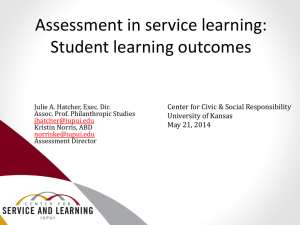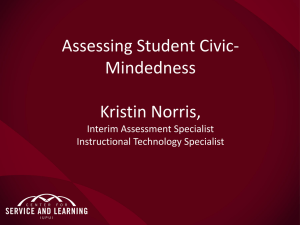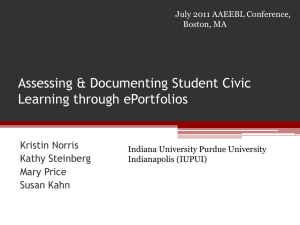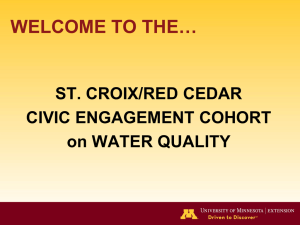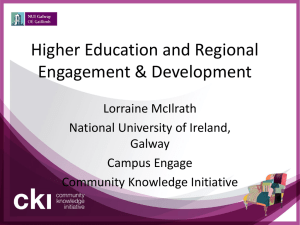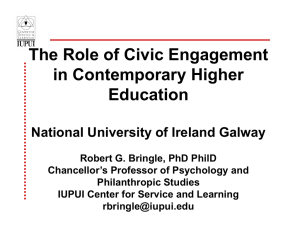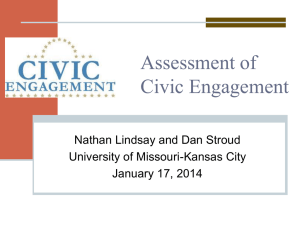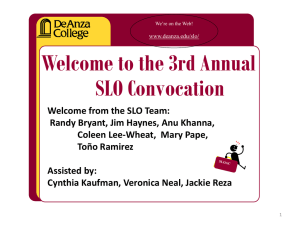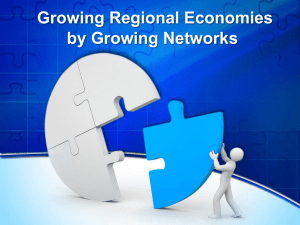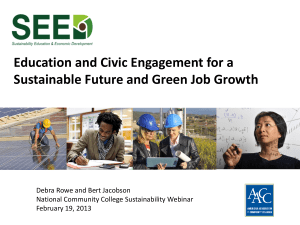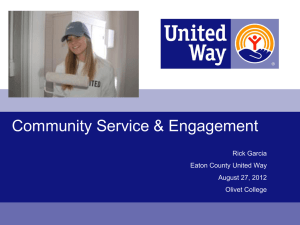Civic Engagement - Oncourse
advertisement
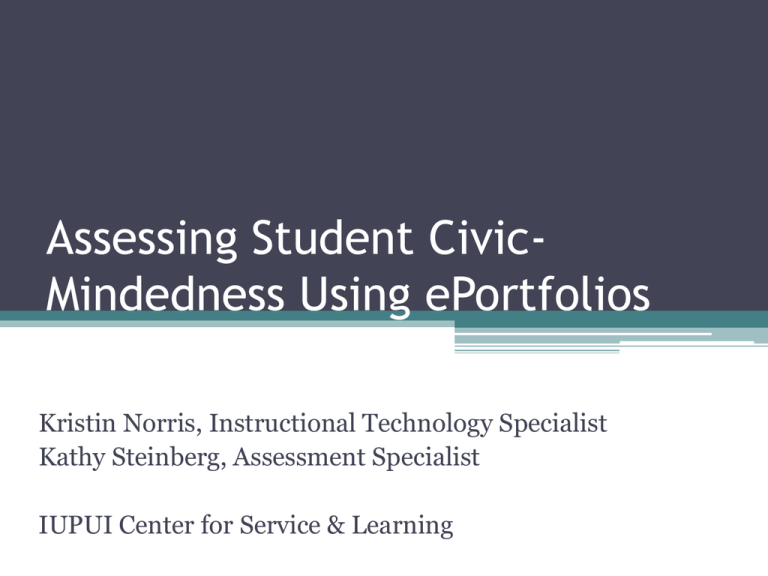
Assessing Student CivicMindedness Using ePortfolios Kristin Norris, Instructional Technology Specialist Kathy Steinberg, Assessment Specialist IUPUI Center for Service & Learning Goals of the session • Generate a clearer understanding of civic engagement and how it contributes to civic learning. • Familiarize participants with tools to assess civic learning on their campus • Demonstrate how assessing civic learning can be realized using ePortfolios. Agenda • • • • 10:15-10:20 Intro 10:20-10:25 Clarify terms 10:25-10:35 Activity: How civic-minded you? 10:35-10:45 Introduce tools to assess CivicMindedness • 10:45-11:15 Activity: Applying rubrics • 11:15-11:25 Overview of ePortfolios on our campus to further civic learning • 11:25-11:30 Questions? Comments? So many terms! What do they mean? Engagement, Outreach, and Public Service • Civic Education • Civic Engagement • Community engagement • Community-based Learning • Community Service • Engaged Scholarship • Experiential Learning • Outreach • Participatory Action Research • • • • • • • • • Partnerships Professional Service Public Scholar Public Service Scholarship of Engagement Service Service Learning Student Engagement Voluntary Service Bringle, Hatcher, Holland (2007). Community Involvement • Teaching, research, and service in the community • Occurs in profit, nonprofit, and government sectors • Has no geographic boundaries Differentiation of Terms Community Involvement ▫ Defined by location ▫ Occurs in the community Civic Engagement ▫ Defined by location and process ▫ Occurs in and with the community ▫ Demonstrates democratic values of participation ▫ Impact + Partnerships Boyer’s Civic Engagement The scholarship of engagement means connecting the rich resources of the university to our most pressing social, civic, and ethical problems, to our children, to our schools, to our teachers, and to our cities. -Boyer (1996) Civic engagement is working to make a difference in the civic life of our communities and developing the combination of knowledge, skills, values and motivation to make that difference. It means promoting the quality of life in a community, through both political and non-political processes. (Ehrlich, 2000, vi) Semantics? Civic Engagement Civic Education Active collaboration that builds upon the resources, skills, expertise, and knowledge of the campus and community to improve the quality of life in communities in a manner that is consistent with the campus mission. Learning activities intended to help students acquire knowledge (e.g. from academic studies, about volunteer opportunities, contemporary social issues), skills (e.g. listening to others, diversity, building consensus), and dispositions (e.g. efficacy, valuing community engagement, social trusteeship of knowledge) related to civic participation, civic processes, and civic systems. What is Civic Learning? Lumina Degree Qualifications Profile • The objectives of Civic Learning rely considerably on students’ out-of-classroom experiences and their development of a capacity for analysis and reflection. • Preparing students for active citizenship. Civic inquiry requires the integration of knowledge and skills acquired in both the curriculum and in the student’s specialized field and engagement. Engagement (including active engagement with others) because students must practice applying those skills to representative questions and problems in the wider society. http://www.luminafoundation.org/publications/The_Degree_Qualifications_Profile.pdf Why do we need more than a vocational education? In part, because we live more than a vocational life: we live a larger civic life and we have to be educated for it. - D. Mathews Distinctions Among Approaches to Service & Experiential Learning Recipient <-------- Beneficiary ----------> Provider Service <-------Focus ---------> Learning Service-Learning Community Service Volunteerism Field Education Internships (Furco, 1996) Community-Based Learning Not all community-based instruction is service learning • Field work experiences (e.g., Museum Studies, Anthropology) • Cooperative Education • Internship • Practicum • Service Learning • Pre-professional field experiences: Clinicals, Student Teaching • Applied Learning • Experiential Learning • Student Engagement Definition Service learning is a course-based, credit-bearing educational experience in which students a) participate in an organized service activity that meets identified community needs benefits the community, and b) reflect on the service activity in such a way as to gain further understanding of course content, a broader appreciation of the discipline, and an enhanced sense of personal values and civic responsibility. (Bringle & Hatcher, 1995) Key Elements of SL • Reflection ▫ “Perplexity” (Dewey, 1933) ▫ Activities to structure learning from the service experience • Reciprocity ▫ Partnerships ▫ Dialogue to structure the service experience • Civic Education ▫ Serving to learn ▫ Learning to serve Students should be able to: • Gain a deep, comparative knowledge of the world’s peoples and problems; • Explore the historical legacies that have created the dynamics and tensions of their world; • Develop intercultural competencies to move across boundaries and unfamiliar territory and see the world from multiple perspectives; • Sustain difficult conversations in the face of highly emotional and perhaps uncongenial differences; • Understand – and perhaps redefine – democratic principles and practices within an intercultural and global context; • Secure opportunities to engage in practical work with fundamental issues that affect communities not yet well served by their societies; and • Believe that actions and ideas matter and can influence their world (Hovland, 2005) The Intellectual Commons—Musil (2009) Essential Questions for Students • Who I am? (knowledge of self) Global Learning Diversity Education Civic Engagement Intellectual Commons • Who are we? (communal/collective knowledge) • What does it feel like to be them? (empathetic knowledge) • How do we talk to one another? (intercultural process knowledge) • How do we improve our shared lives? (applied, engaged knowledge) Activity: How civic-minded are you? Please take a few minutes to respond to a list of items (Civic-Minded Professional Scale)(Hatcher, 2008) rating yourself on a scale of 1-5 (1= strongly disagree, 5 = strongly agree) Introduction to Civic-Mindedness You want me to assess what? Civic-Minded Professional A civic-minded professional is one who a) is skillfully trained through formal education, b) with the ethical disposition as a social trustee of knowledge, and c) the capacity to work with others in a democratic way d) to achieve public goods. Civic-Minded Professional Factors of Civic-Minded Professional Scale • • • • • Voluntary Action Identity and Calling Citizenship Social Trustee of Knowledge Consensus Building Hatcher, 2008 Civic-Minded Graduate “North Star” A civic-minded graduate is one who a) is formally educated and b) has the capacity and orientation to work with others c) in a democratic way d) to improve the community. CSL, in process Civic-Minded Graduates Civic-Minded Graduate (CMG) Identity 3 1 Educational Experiences 2 Civic Experiences Cultural Norms and Social Context CMG Narrative Prompt I have a responsibility and a commitment to use the knowledge and skills I have gained as a college student to collaborate with others, who may be different from me, to help address issues in society. CMG Rubric 5 dimensions: . • civic-identity • understanding how social issues are addressed in society • active participation in society to address social issues • collaboration with others (includes diversity, interconnectedness, mutuality, and respect) • benefit of education to address social issues Activity: Applying Rubrics 1. Become familiar with only 1 row of the rubric (read the first and last cell aloud). 2. Read the 3 examples from students. 3. Rate the submission using the rubric (just 1 row/domain). 4. Debrief Why Civic Learning ePortfolios? How are we approaching this at IUPUI? Value of ePortfolios for Service Learning & Civic Engagement • Most assessment tools are self-report instruments (nationally and locally) • Eportfolios provide “authentic” assessment evidence/data • Draw on strengths of Service Learning ▫ critical reflection • Eportfolios are not just for research ▫ also for course use and program assessment ▫ designs can be simple or complex Various forms of Portfolios at IUPUI • Course-based (ex - First Year Seminars , capstone) • Process (Matrix) • Assessment/Evaluation (Matrix with Evaluation tools and report functionality) • Presentation (both students and faculty) Service Learning Assistant Example Process Matrix Activities around ePortfolios • • • • • Faculty Development Partnering with other campus units Course-related activities Program-related activities Workshops available to our scholars, faculty, & students Activities around ePortfolios • Faculty Development ▫ Recruited a cohort of instructors teaching a First-Year Seminar, using our campus-level ePDP (Personal Development Planner through an ePortfolio) ▫ Created a Civic Learning Working Group – how were they incorporating Service Learning into their curriculum and how could the ePDP make that more visible? ▫ Gave them funding for an SLA (we trained the students on the ePDP) so the faculty could focus on teaching ▫ Conducted a faculty workshop on scaffolding, reflection and the ePDP Activities around ePortfolios • Partnering with other units on campus ▫ University College (entry-point for more first year students) ▫ Assisted them in developing the sections for the ePDP and the associated reflection prompts and rubrics ▫ Helped with training faculty using the ePDP ▫ Other ideas – Common Theme Book, Study Abroad, Undergraduate Research, Student Affairs, Programs with a great deal of Service Learning Activities around ePortfolios • Course Related Activities ▫ Identify courses already using SL ▫ Introduce small activities – digital stories Helps to facilitate the critical reflection process Produces a product students can include in an ePortfolio if they already have one, or use to start their own Engages them in an activity that yields a great deal for the students Activities around ePortfolios • Program Related Activities ▫ Scholarship program related digital stories Alternative breaks trips Social justice issue Focused on issues in the community ▫ Departments with a great deal of service learning Activities around ePortfolios • Workshops available to our scholars, faculty, & students ▫ ePortfolios: The Basics ▫ ePortfolios: Making Meaning & Sharing with Others ▫ Faculty Consultations ▫ Classroom sessions References Adelman, Cliff, Peter Ewell, Paul Gaston, and Carol G. Schneider (2011). Degree Qualifications Profile. Lumina Foundation: Indianapolis, IN. http://www.luminafoundation.org/publications/The_Degree_Qualifications_Profile .pdf Boyer, E. L. (1994). The scholarship of engagement. Journal of Public Service and Outreach, 1(1), 11-20. Bringle, R. G., & Hatcher, J. A. (1995). A service-learning curriculum for faculty. Michigan Journal of Community Service Learning, 2, 112–122. Bringle, R. G., Hatcher, J. A,., Holland, B. (2007). Conceptualizing civic engagement: Orchestrating change at a metropolitan university. Metropolitan Universities, 18(3), 57-74. Ehrlich, T. (2000). Civic responsibility and higher education. Phoenix, AZ: Oryx. Furco, Andrew. "Service-Learning: A Balanced Approach to Experiential Education."Expanding Boundaries: Service and Learning. Washington DC: Corporation for National Service, 1996. 2-6. Hatcher, J.A. (2008). The Public Roles of Professionals: Developing and Evaluating the Civic-Minded Professional Scale . Unpublished doctoral dissertation, Indiana University, Indiana). References Hovland, K. (2005). “Shared futures: Global learning and social responsibility”. Diversity Digest, 8(3), 1, 16-17. Kuh, G. D. (2008). High-impact educational practices: What they are, who has access to them, and why they matter. Washington, DC: Association of American Colleges and Universities. Mathews, D. (1999). Civic intelligence in higher education and the practice of democratic politics. Kettering Foundation Publication. Musil, C (2009). Educating students for personal and social responsibility: The civic learning spiral. In B. Jacoby, Civic engagement in higher education: Concepts and practices (pp. 49-68). San Francisco, CA: Jossey-Bass. Steinberg, Kathryn S., Julie A. Hatcher, and Robert G. Bringle (2011). “A North Star: Civic-Minded Graduate.” Paper submitted to Michigan Journal for Community Service Learning. Questions? Comments? Feel free to contact us! Kristin Norris (norriske@iupui.edu) Kathy Steinberg (ksteinbe@iupui.edu)
